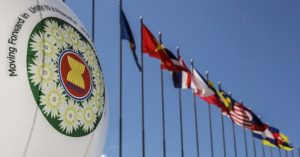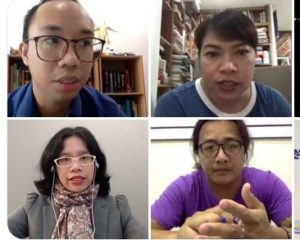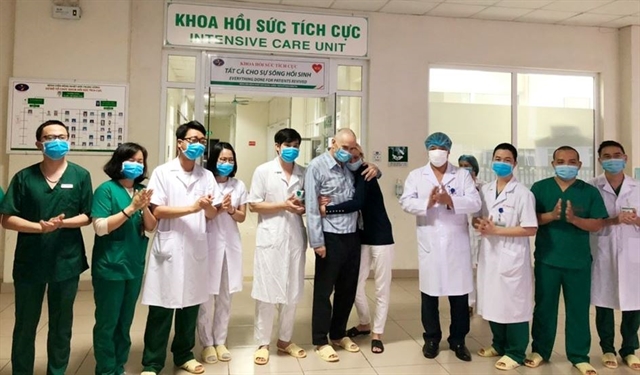COVID-19 PANDEMIC Day 139: ASIA & PACIFIC COVID-19, a litmus test for ASEAN

COVID-19, a litmus test for ASEAN
Top (left to right) Dr. Dr. Lee Edson P. Yarcia, JD, Health Law, and Policy Reform Consultant, Philippines; H.E. Yuyun Wahyuningrum, Indonesian Representative to the ASEAN Intergovernmental Commission on Human Rights (AICHR). Bottom (left to right): Dr. Deasy Simandjuntak, Associate Fellow at ISEAS – Yusof Ishak Institute, Singapore, and Visiting Fellow at Academia Sinica, Taipei; Mr. Thet Swe Win, Executive Director Synergy – Social Harmony Organization, and Co-Founder of Myanmar COVID-19 Response Center
BANGKOK – With over 13,000 cases of COVID-19 in the ASEAN Region, many countries are still treating the pandemic as a security issue rather than a health and medical issue. This was an observation shared by the civil society groups in South East Asia in a web conference discussing the region’s present and future condition in time of COVID-19 on 13 April.
“In Myanmar, more people are killed by the Army, much more than the COVID-19,” Thet Swe Win the Co-Founder of Myanmar COVID-19 Response Center, said. Myanmar has 4 recorded COVID-19 deaths while 142 civilian deaths in Arakan State during the week.
In the Philippines, police force and the military are mobilized to enforce quarantine measures. Police are also tapped in Thailand to apprehend curfew violators since it imposed the partial lockdown in various cities and provinces starting March 24.
Sriprapha Petcharamesree, former Thai Representative to the ASEAN Intergovernmental Commission on Human Rights (AICHR) and Programme Chair of SHAPE-SEA (Strengthening Human Rights and Peace Research and Education in ASEAN/Southeast Asia) said even before the pandemic, the political trend in the region is not democratic.
.

Ads by: Memento Maxima Digital Marketing
@ [email protected]
– SPACE RESERVE FOR YOUR ADVERTISEMENT
“Although countries have implemented varying measures to response to COVID-19, a worrying trend is the use of repressive laws, such as emergency powers,” she said.
.

Ads by: Memento Maxima Digital Marketing
@ [email protected]
– SPACE RESERVE FOR YOUR ADVERTISEMENT
Lockdown
Following the example of Wuhan which became the epicenter of COVID-19, various countries try to imitate its success in flattening the curve.
In the Philippines, a month-long total lockdown was imposed but extended until April 30. In Myanmar, the 10-day lockdown started on April 13 while Jakarta in the Indonesian capital started on April 10. Other cities and provinces will follow suit depending on their governors. Thailand and Laos closed their borders starting March 21 and imposed month-long restrictions on movement.
Deasy Simandjuntak, ISEAS-Yusof Ishak Institute, Singapore and an expert on Indonesian issues, said that some sort of lockdown are considered depending on the socio-economic situation of the country.
Simandjuntak explained that to contain the infection, countries need to suppress and flatten the curve.
“To suppress means to slash the infection daily and the only way to do it is to restrict movement or lockdown. To flatten the curve does not mean lower numbers of infection but measures are done so our hospitals will not be burdened.”
To flatten the curve measures such as physical distancing, track and tracing, and testing are implemented.
.

Ads by: Memento Maxima Digital Marketing
@ [email protected]
– SPACE RESERVE FOR YOUR ADVERTISEMENT
Right to Health is human rights
ASEAN countries are left to their own devices in addressing the pandemic. Hence, the relevance of the organization is now in question. Civil society and human rights groups identified the human rights facing the people particularly the marginalized and vulnerable groups which are mostly left out and have become collateral damage.
Among the human rights issues discussed in the forum were food insecurity, domestic violence, stigmatization and xenophobia. Lack of support and discrimination against health workers and infected patients are one of the trends in the region.
‘In Myanmar, the number of COVID-19 cases appear low because there aren’t enough facilities for testing. But what we’re most worried about the social impact of the virus: victim-blaming and shaming, as well as anxiety,’ Thet Swe Win said.
He also said that migrant workers returning to Myanmar are reluctant to reveal their true travel history to health care professionals which may result in more infections.
Although some countries may not be able to provide adequate measures to assist their citizens, denying them basic services like food, medical care and necessary services is inexcusable. Dr. Lee Edson P. Yarcia, also a lawyer and Health Law and Policy Reform Consultant from the Philippines emphasized that under the Universal Declaration of Human Rights, the States have the obligation to ensure the right to health standard.
“States have obligations to respect, protect, and fulfill human rights even during pandemics,” he said.
.

Ads by: Memento Maxima Digital Marketing
@ [email protected]
– SPACE RESERVE FOR YOUR ADVERTISEMENT
Freedom of Expression
COVID-19 has become an excuse to impose draconian measures and emergency laws that suppress freedom of speech and as well as the legitimate call of the people for improved health and medical services.
“When a government chooses not to disclose data, it creates a false sense of security. Government suppresses information for fear of social and political unrest,” Simandjuntak said.
Dr. Yarcia mentioned that in the Philippines, social media has become a tool to resist abuses from the government. The National Bureau of Investigation (NBI) is also actively pursuing cases against government critics. Due to the backlash in social media, the NBI steps back.
Dr. Yarcia said that monitoring and documentation process on the abuses of the authorities in times of pandemic are important in transitional justice later on.
“Government accountability can be pursued. Challenge government more, mobilize our networks and resist any forms of abuses from our governments,” Dr. Yarcia said.
.

Ads by: Memento Maxima Digital Marketing
@ [email protected]
– SPACE RESERVE FOR YOUR ADVERTISEMENT
.
COVID-19 and the ASEAN
To remain relevant, the ASEAN member countries particularly the AICHR to develop monitoring systems to monitor the human rights impact of the pandemic and to develop a common position on human rights. Despite the challenges, particularly the COVID-19 which definitely lead the region to joblessness, economic slow-down, high rate of poverty, optimism remains.
However, Yuyun Wahyuningrum, Indonesian Representative to AICHR said that the main challenge in the ASEAN is the reluctance to transparently share information making it difficult for ASEAN as a regional entity to move forward in overcoming COVID-19.
“COVID-19 is the new normal. We have to explore further on how AICHR work, open to more inputs and opportunities for change,” Wahyuningrum said.
Dr. Yarci emphasized that the member countries must go back to the ASEAN Post-2015 Health Development Agenda Goals for 2020 which states, “to promote resilient health system in response to communicable diseases, emerging infectious diseases, and neglected tropical diseases.”
The webinar on ASEAN Community and COVID-19: An Assessment of an Infected Region’s Present and Future Condition is the second part of the six series webinar starting April and May 2020 on: The Status of Human Rights in the Time of COVID-19 Pandemic in Southeast Asia organized by Asian Forum for Human Development (Forum-Asia) and SHAPE-SEA./ By: Eunice Barbara C. Novio – INQUIRER.net
For more news about the novel coronavirus click here.
What you need to know about Coronavirus.
For more information on COVID-19, call the DOH Hotline: (02) 86517800 local 1149/1150.
.
 Ads by: Memento Maxima Digital Marketing
Ads by: Memento Maxima Digital Marketing
@ [email protected]
– SPACE RESERVE FOR YOUR ADVERTISEMENT
MANILA- Philippines records 18 new coronavirus deaths, 284 more cases

MANILA (Reuters) – The Philippine health ministry on Monday reported 18 new coronavirus deaths and 284 additional infections.
In a bulletin, the health ministry said total deaths have reached 315, while confirmed cases have increased to 4,932, adding 45 patients have recovered, bringing the total to 242.
(Reporting by Neil Jerome Morales; Editing by Mark Potter)
.
RELATED STORY:
Coronavirus deaths spike ahead of mass testing in Philippines

Supply of testing kits, labs set to help govt better gauge efficacy of community quarantine measures.
Philippine health officials yesterday reported a record number of deaths in one day from the coronavirus, two days before they begin mass testing, which is expected to lead to a spike in the number of confirmed infections.
.
<covid-19>
.
SINGAPORE- Record 386 new coronavirus cases in S’pore; 65-year-old S’porean man becomes 9th person to die from virus

SINGAPORE – Singapore reported a record 386 new cases of Covid-19 infection on Monday (April 13), of which 280 are linked to known clusters.
The vast majority of these are foreign workers living in dormitories, the Ministry of Health (MOH) said in its daily update.
A 65-year-old Singaporean man has also become the ninth here to die of complications due to Covid-19 infection.
The man was first confirmed to be infected on April 9, the ministry said in a statement, adding that Khoo Teck Puat Hospital has reached out to his family and is extending assistance to them.
There are also 222 more cases linked to the S11 Dormitory @ Punggol, Singapore’s largest cluster which now has 586 cases.
Four new clusters have also been uncovered at facade installation company CitiWall at Kaki Bukit Crescent, ABC Hostel at Jalan Kubor, Tech Park Crescent dormitory and Kranji Dormitory.
A 77-year-old resident of Vanguard Healthcare’s Woodlands Care Home was also among the new cases. The Agency for Integrated Care (AIC) said in a statement on Monday that he is in an isolation room at Khoo Teck Puat Hospital.
Contact tracing is ongoing and those who had close contact with the resident will be quarantined, a spokesman said.
The Senior Care Centre located at Woodlands Care Home has remained open during the circuit breaker to care for clients with no alternative arrangements, but it will now be closed, AIC said.
Alternative arrangements have been made for the centre’s clients, while another centre has been appointed as a replacement, it added.
E-Bridge Preschool at Corporation Drive has also shut temporarily, after a child who was last at the centre on April 7 tested positive for Covid-19.
The Early Childhood Development Agency (ECDA) said on Monday that the centre will be closed until April 21 and contact tracing is under way. The premises will undergo thorough cleaning and disinfection, it added.
The centre will resume limited service provision thereafter to serve parents who are working in essential services and unable to extend their alternative care arrangements beyond the closure period.
The MOH said that another 26 patients were discharged on Monday, bringing the total of those who have fully recovered to 586.
Of the 1,158 confirmed cases still in hospital, most are stable or improving, while 29 are in critical condition in the intensive care unit.
The latest cases bring Singapore’s total to 2,918.
.
<covid-19>
.
DILI, Leste-Timor-
.

All photographs, news, editorials, opinions, information, data, others have been taken from the Internet ..aseanews.net | [email protected] | Fo r comments, Email to : Al Bulario
















